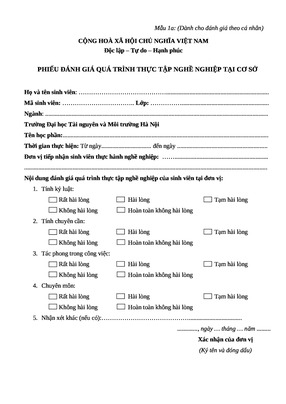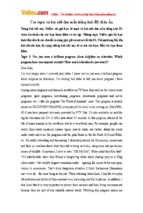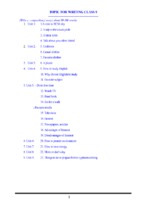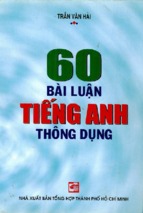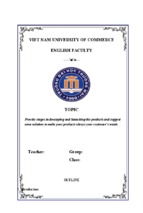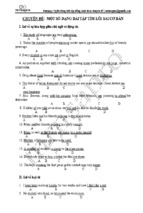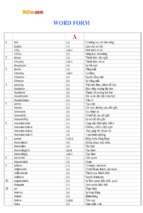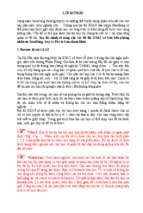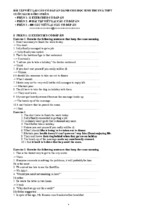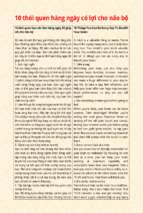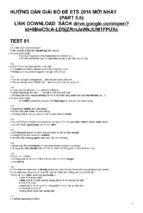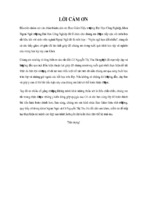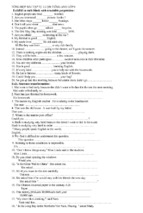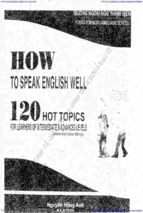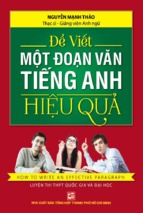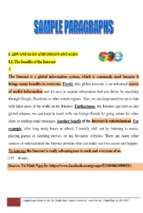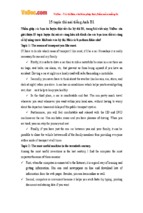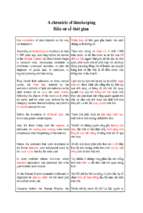Chuyên đề
1
NGỮ ÂM
Bài tập ngữ âm trong các đề thi trắc nghiệm tiếng Anh thƣờng kiểm tra cách phát âm
đúng các từ, trong đó có các nguyên âm, phụ âm và trọng âm từ, bao gồm hai dạng bài tập
sau:
- Bài tập về cách phát âm (nguyên âm, phụ âm, tập hợp âm)
- Bài tập về trọng âm từ
Bài tập về cách phát âm có thể kiểm tra cách phát âm của một chữ cái hoặc nhiều chữ
cái.
Ví dụ: Chọn phƣơng án A, B, C hoặc D ứng với từ có phần gạch chân đƣợc phát âm
khác với các từ còn lại trong mỗi câu sau:
1.
A. such
B. cut
C. put
D. shut (đáp án C)
2.
A. shown
B. flown
C. grown
D. crown (đáp án D)
Các chữ cái đƣợc kiểm tra trong một câu có thể giống nhau, nhƣng cũng có thể khác
nhau.
Ví dụ: Chọn phƣơng án A, B, C hoặc D ứng với từ cón phần gạch chân đƣợc phát âm
khác với các từ còn lại trong mỗi câu sau:
1.
A. accountant B. amount
C. founding D. country (đáp án D)
2.
A. forget
B. forty
C. comfort
D. mother (đáp án D)
Trong hệ thống ngữ âm của tiếng Anh có 24 phụ âm (consonants), 22 nguyên âm
(vowels) và nguyên âm đôi (diphthongs). Các nguyên âm và phụ âm tiếng Anh có cách phát
âm nhất định, chúng ta hãy chú ý đến một số cách phát âm thông thƣờng của một số chữ cái
tiếng Anh sau:
I. NGUYÊN ÂM
Chữ cái a thƣờng đƣợc phát âm là:
1.
/ae/: map, national
2.
/eɪ/: take, nature
3.
/ᴐ/ (đặc biệt trƣớc chữ cái l): all, altogether
4.
/ɒ/: want, quality
5.
/e/: many, any
6.
/ɪ/: message, dosage
7.
/ə/: afraid, familiar
8.
/ɑ:/: after, car
Chữ cái e thƣờng đƣợc phát âm là:
1.
/e/: educate, flexible
2.
/ɪ/: explore, replace
3.
/i:/: fever, gene
4.
/ə/: interest, camera
Chữ cái i thƣờng đƣợc phát âm là:
1.
/ɪ/: fit, slippery
2.
/ai/: strive, mice
3.
/ə/: terrible, principle
Chữ cái o thƣờng đƣợc phát âm là:
1.
/ɒ/: bottle, floppy
2.
/ɔ:/: boring, lord
3.
/ᴧ/: son, done
4.
/əʊ/ go, post
5.
/ə/: computer, purpose
6.
/wᴧ/: one /wᴧn/, once /wᴧns/
Chữ cái u thƣờng đƣợc phát âm là:
1.
/ʊ/: put, push
2.
/u:/: include
3.
/ju:/: computer, human
4.
/ᴧ/: much, cut
5.
/ə/: success
6.
/з:/: burn
Chữ cái y thƣờng đƣợc phát âm là:
1.
/ɪ/: physics, myth
2.
/i/: city, worry
3.
/ai/: shỵ, multiply
Một số nhóm chữ cái nguyên âm thƣờìig gặp:
Nhóm chữ cái
Cách phát âm thƣờng gặp
Ví dụ
/ei/
main, entertain
/eə/
fair, armchair
-ay-
/ei/
say, stay
-au-
/ɔ:/
audience, naughty
-aw-
/ɔ:/
awful, law
/e/
dead
/eɪ/
great, break
/i:/
bean, beat
/ɪə/
fear, year
/з:/
heard, earth
/eɪ/
eight, weight
/i:/
deceive, ceiling
/aɪ/
height
-ai-
-ea-
-ei-
/eɪ/
/i:/
hey, convey, key
/i:/
cheese, employee
/ɪə/
engineer, deer
/i:/
piece, relieve
/aɪ/
tie, lie
/ə/
ancient, proficient
/aɪə/
quiet, society
/əʊ/
load, toast
/ɔ:/
abroad, broaden
-oe-
/əʊ/
toe, foe
-oi- hoặc –oy-
/ɔɪ/
voice, join, joy
/u:/
tool, moon
/ʊ/
book, foot
/ʌ/
flood, blood
/ʊ/
could, would
/u:/
group, souvenir
/ə/
famous, tremendous
/ʌ/
trouble, couple
/əʊ/
soul, mould
/aʊ/
mouse, account
/aʊ/
cow, brown
/əʊ/
throw, know
-ui-
/ɪ/
build, guitar
-uy-
/aɪ/
buy, guy
-ew-
/ju:/
new, dew
-ey-ee-
-ie-
-oa-
-oo-
—ou—
-ow-
Chú ý:
Những quy tắc trên chỉ là những cách đọc phổ biến, chúng ta còn gặp những trƣờng hợp
ngoại lệ. Chúng ta nên ghi nhớ cách phát âm của các từ khi học từ vựng mới.
Cách phát âm các nguyên âm còn khác nhau ở các từ loại khác nhau:
invite /in'vaɪt/ (v); invitation /ˌinvi'teɪʃh/ (n)
nature /'neɪtʃh(r)/ (n); natural /'n„tʃrəl/ (adj)
II. PHỤ ÂM
Chúng ta hãy chú ý đến một số trƣờng hợp sau.
Chữ cái c thƣờng đƣợc phát âm là:
1.
/k/: can, close
2.
/s/ (đặc biệt khi nó đứng trƣớc i, e hoặc y): city, certify, cycle
3.
/ʃ/: special, ocean
Chữ cái d thƣờng đƣợc phát âm là:
1.
/d/: day, demand
2.
/dʒ/: educate, graduate
Chữ cái g thƣờng đƣợc phát âm là:
1.
/g/: gain, regular
2.
/dʒ/ (đặc biệt khi nó đứng trƣớc i, e, hoặc y):origin, germ, gymnast
3.
/ʒ/: garage, beige
Chữ cái n thƣờng đƣợc phát âm là:
1.
/n/: not, fun
2.
/ŋ/: uncle, drink
Chữ cái s thƣờng đƣợc phát âm là:
1.
/s/: son, economist
2.
/z/: rise, resumption
3.
/ʃ/: sure, sugar
4. /ʒ/: usually, occasion
Chữ cái t thƣờng đƣợc phát âm là:
1.
/t/: ten, pretend
2.
/tʃ/: culture, question
3.
/ʃ/: mention, initial
Chữ cái x thƣờng đƣợc phát âm là:
1.
/gz/: example, exist
2.
/ks/: box, mixture
3.
/kʃ/: luxury, anxious
Một số nhóm chữ cái phụ âm thƣờng gặp:
Nhóm chữ cái
Cách phát âm thƣờng gặp
Ví dụ
/k/
chemist, mechanic
/tʃ/
chair, lunch
/ʃ/
machine, chef
-gh- hoặc -ph-
/f/
rough, laugh photograph,
paragraph
-qu-
/kw/
-sh-
/ʃ/
share, smash
-th-
/θ/
/ð/
think, depth
them, without
-ch-
queen, require
Cách phát âm tận cùng -s hoặc -es
Đối với cách phát âm của tận cùng -s hoặc -es của động từ ngôi thứ ba số ít thì Hiện tại
đơn hoặc danh từ số nhiều, ta có 3 cách đọc khác nhau dựa vào âm cuối của từ đó.
1. Phát âm là /s/ khi âm cuối của từ đó là: /f/, /k/, /p/, /t/, /θ/.
Ví dụ: laughs /la:fs/, parks /pa:ks/, hopes /həʊps/, hates /heɪts/, cloths /klɒθs/.
2. Phát âm là /z/ khi âm cuối của từ đó là: /b/, /d/, /g/, /1/, /m/, /n/, /r/, /v/, /ð/, /ŋ/ và các
nguyên âm.
3. Phát âm là /iz/ khi âm cuối của từ đó là /s/, /ʃ/, /t ʃ/, /z/, /dʒ/.
Ví dụ: crosses /'krɔ:sɪz/, pushes /'poʃɪz/, watches /'wɒtʃɪz/, buzzes /'bʌzɪz/, changes
/'tʃeɪdʒɪz/.
Cách phát âm của tận cùng -ed của động từ có quy tắc
Đối với cách phát âm của tận cùng -ed của động từ có quy tắc (regular verbs), ta có 3
cách phát âm khác nhau dựa vào âm cuối của động từ nguyên mẫu.
1. Phát âm là /t/ khi âm cuối của động từ nguyên mẫu là: /f/, /k/, /p/, /s/, /tʃ/, và /ʃ/.
Ví dụ: coughed /kɒft/, talked /tɔ:kt/, stopped /stɒpt/, watched /wɒtʃt/, brushed
/brʌʃt/.
2. Phát âm là /d/ khi âm cuối của động từ nguyên mẫu là: /b/, /g/, /l/, /m/, /n/, /dʒ/,
/r/, /v/, /z/ và các nguyên âm.
3. Phát âm là /id/ khi âm cuối của động từ nguyên mẫu là: /t/, /d/.
Ví dụ: waited /'weɪtɪd/, added /'ædɪd/.
III. ÂM CÂM
Một số chữ cái trong một số từ bao gồm phụ âm và nguyên âm không đƣợc phát âm
thành tiếng đƣợc gọi là âm câm (silent sounds). Sau đây là một số âm câm thƣờng gặp:
Chữ cái – Trƣờng hợp thƣờng gặp
Ví dụ
b đứng cuối trong một số từ (thƣờng đi sau m)
b đứng trƣớc t
climb, dumb, comb
doubt, debt
c đứng trƣớc k
c đứng sau s trong một số từ
snack, dock
scene, muscle, science
d trong một số từ
handsome, Wednesday
h trong một số từ
hour, exhausted
gh trong một số từ (đặc biệt là sau i)
weigh, sight
k đứng trƣớc n
know, knee, knife
l trong một số từ
half, could
n đứng sau m
autumn, condemn
p đứng đâu một từ, theo sau là một phụ âm và một số psychology, receipt
trƣờng hợp khác
r đứng trƣớc một phụ âm khác hoặc đứng cuối từ đó
card, park, farm, burn,
neighbour, volunteer
t trong một số từ
listen, castle
w đứng trƣớc r hoặc h trong một số từ
wreck, who
IV. TRỌNG ÂM
Đối với những từ trong tiếng Anh có từ hai âm tiết trở lên, có một âm tiết đƣợc nhấn
mạnh với cao độ và trƣờng độ lớn hơn những âm tiết còn lại. Đó chính là âm tiết mang trọng
âm (stress) của từ đó.
Những từ có ba âm tiết trở lên thƣờng có thêm trọng âm phụ (secondary stress) (ˌ)
đƣợc nhấn nhẹ hơn so với trọng âm chính (primary stress) (').
Ta thƣờng gặp bài tập tìm từ có trọng âm chính nhấn vào âm tiết có vị trí khác với ba từ
còn lại. Ngoài ra, có thế có bài tập tìm từ có trọng âm chính rơi vào âm tiết đầu, thứ hai...
hoặc âm tiết cuối trong mỗi từ.
Nhìn chung, chúng ta có một số quy tắc sau:
1. Đa số các động từ hai âm tiết có trọng âm rơi vào âm tiết thứ hai:
attract, begin, deny, forget, enjoy, pollute, relax...
Trƣờng hợp ngoại lệ: answer, enter, happen, offer, open...
2. Đa số các danh từ và tính từ hai âm tiết có trọng âm rơi vào âm tiết thứ nhất:
children, hobby, habit, labour, trouble, standard...
basic, busy, handsome, lucky, pretty, silly...
Trƣờng hợp ngoại lệ:
advice, reply, machine, mistake...
alone, abrupt, absorbed, amazed...
3. Một số từ có hai âm tiết vừa là danh từ và cũng là động từ thì danh từ có trọng âm ở
âm tiết thứ nhất, còn động từ thì trọng âm rơi vào âm tiết thứ hai.
Danh từ
Động từ
'contrast (sự tƣơng phản)
con'trast (tƣơng phản)
'decrease (sự giảm)
de'crease (giảm)
'desert (sa mạc)
de'sert (rời bỏ)
'export (hàng xuất khẩu)
ex'port (xuất khẩu)
'import (hàng nhập khẩu)
im'port (nhập khấu)
'present (món quà)
pre'sent (trình bày)
'produce (sản phấm nói chung)
pro'duce (sản xuất)
'progress (sự tiến bộ)
pro'gress (tiến bộ)
'protest (sự phản đổi)
pro'test (phản đối)
'rebel (kẻ nổi loan)
re'bel (nổi lọan)
'record (hồ sơ, đĩa hát)
re'cord (ghi lại, giữ lại)
'suspect (kẻ bị tình nghi)
su'spect (nghi ngờ)
Ngoại lệ: Một số từ sau vừa là danh từ và động từ nhƣng có trọng âm chính không đổi.
'answer (n, v): câu trả lời/ trả lời
'offer (n, v): lời đề nghị/ đề nghị
'picture (n, v): bức tranh/ vẽ một bức tranh
'promise (n, v): lời hứa/ hứa
'travel (n, v): du lịch/ đi du lịch
'visit (n, v): cuộc viếng thăm/ viếng thăm
ad'vice (n, v): lời khuyên/ khuyên bảo
re'ply (n, v): lời đáp/ trả lời
4. Đối với các danh từ ghép đƣợc viết liền nhau thì trọng âm thƣờng rơi vào âm tiết thứ
nhất.
airport, birthday, bookshop, gateway, guidebook, filmmaker...
Danh từ ghép tạo thành từ ngữ động từ (phrasal verbs) có trọng âm chính rơi vào thành
phần thứ nhất còn ngữ động từ tƣơng ứng có trọng âm chính rơi vào thành phần thứ hai và
động từ nhận trọng âm phụ.
Danh từ ghép:
'check-up (sự kiểm tra toàn bộ nhất là sức khỏe)
'check-in (sự đăng kí ở khách sạn, sự đăng kí đi máy bay)
'dropout (ngƣời nghỉ học nửa chừng)
'breakdown (sự hỏng máy)
‗tryout (sự thử)
'walkout (sự đình công đột ngột)
Ngữ động từ:
ˌcheck 'up, ˌCheek 'in, drop 'out, break 'down, ˌtry 'out, ˌWalk 'out...
5. Một số tính từ ghép có trọng âm chính rơi vào thành phần thứ nhất.
'airsick (say máy bay)
'airtight (kín hơi)
'homesick (nhớ nhà)
'praiseworthy (đáng khen)
'trustworthy (đáng tin cậy)
'waterproof (không thấm nƣớc)...
Ngoại lệ:
ˌduty-'free (miễn thuế), snow-'white (trắng nhƣ tuyết)
6. Các tính từ ghép có thành phần đầu tiên là tính từ hoặc trạng từ và thành phần thứ hai
tận cùng là -ed thì trọng âm chính rơi vào thành phần thứ hai.
ˌbad-'tempered (xấu tính, dễ nổi nóng)
ˌshort-'sighted (cận thị)
ˌill-'treated (bị đối xử tệ)
ˌwell-'done (tốt, đƣợc nấu kỹ)
ˌwell-in'formed (thông thạo, có đƣợc thông tin)
ˌwell-'known (nổi tiếng)
7. Đối với các từ có tiền tố thì nhìn chung trọng âm không thay đổi so với từ gốc (nghĩa là
trọng âm ít khi rơi vào tiền tố).
successful /sək'sesfl/→ unsuccessful /ˌʌnsək'sesfl/
able /'eɪbl/ → unable /ʌn'eɪbl/
Tuy nhiên, có một số trƣờng hợp ngoại lệ đặc biệt là các từ có tiền tố under-: underlay
/'ʌndəleɪ/
underpass /'ʌndəpa:s/
8. Đối với các từ có hậu tố thì trọng âm có thể thay đổi, nhƣng cũng có thể không thay đổi,
và nếu có sự thay đổi về trọng âm thì cũng có thể thay đổi về cách phát âm.
protect /prə'tekt/ → protection /pro'təkʃn/ (không thay đổi về trọng âm)
accident /'„ksɪdənt/ → accidental /ˌ„ksɪ'dentl/ (thay đổi về trọng âm)
Tuy nhiên đối với các trạng từ đƣợc tạo thành từ tính từ bằng cách thêm hậu tố -ly thì
không thay đổi vị trí trọng âm.
careful /'keəfl/ —» carefully /'keəfəli/
Các hậu tố thƣờng không làm thay đổi trọng âm của từ gốc là:
-ment
agree /ə'gri:/
→ agreement /ə'gri:mənt/
-ship
relation /r'leɪʃn/
→ relationship /ri'leiʃnʃip/
-ness
happy /'h„pi/
→ happiness /'h„pinəs/
-er/-or
manage /'m„nɪdʒ/
→ manager /'m„nidʒə(r)/
-hood
neighbour /'neibə(r)/
→ neighbourhood /'neibəshʊd/
-ing
excite /ik'saɪt/
→ exciting /ik'saitiŋ/
-ise/-ize
modern /'mɒdn/
→ modernize /'mɒdənaiz/
-en
shorten /'ʃɔ:tn/, lengthen /'leŋθən/
-full
success /sək'ses/
→ successful /sək'sesfl/
-less
meaning /'mi:miŋ/
→ meaningless /'mi:s/niŋləs/
-able
rely /rɪ'laɪ/
→ reliable /rɪ'laɪəbl/
-ous
poison /'pɔɪzn/
→ poisonous /'pɔɪzənəs/
Các danh từ có hậu tố là -sion, -tion, hoặc -cian thì trọng âm chính thƣờng rơi vào
âm tiết ngay trƣớc đó (chính là âm tiết thứ hai từ cuối lên).
precision /prɪ'sɪʒn/
communication /kəˌmju:nɪ'keɪʃn/
mathematician /ˌm„θəmə'tɪʃn/
10. Các danh từ có hậu tố là -ity, -logy, hoặc -graphy thì trọng âm chính thƣờng rơi vào âm
tiết thứ ba từ cuối lên.
ability /ə'bɪləti/
technology /tek'nɒlədʒi/
9.
geography /dʒi'ɒgrəfi/
11. Các tính từ có hậu tố là -ic thì trọng âm chính thƣờng rơi vào âm tiết ngay trƣớc đó
(chính là âm tiết thứ hai từ cuối lên).
scientific /ˌSaɪən'tɪfɪk/
Còn những tính từ có hậu tố là -ical thì trọng âm chính thƣờng rơi vào âm tiết thứ ba từ
cuối lên.
electrical /ɪ'lektrɪkl/
mathematical /ˌm„θə'm„tɪkl/
12. Những từ có hậu tố nhƣ sau thì trọng âm chính thƣờng rơi vào âm tiết cuối (chính
là hậu tố đó).
-ee
agree /ə'gri:/, trainee /treɪ'ni:/
-eer
volunteer/ˌvɒlən'tɪə(r)/, engineer/ˌendʒɪ'nɪə(r)/
-ese
Vietnamese /ˌvjetnə'mi:z/
-ique/ -esque
unique /ju'ni:k/, picturesque /ˌpɪktʃə'resk/
-ain (đối với động từ)
retain /rɪ'teɪn/, maintain /meɪn'teɪn/
Ngoại lệ: committee /kə'mɪti/, coffee /'kɒfi/, employee /im'plɔɪi:/
BÀI TẬP VÊ PHÁT ÂM
Exercise 1: Pick out the word whose underlined part is pronounced differently from that
of the other words.
1. A. matter
B. back
C. bag
D. talk
2. A. that
B. catch
C. bad
D. wash
3. A. day
B. take
C. face
D. any
4. A. lazy
B. lapel
C. label
D. laborer
5. A. butter
B. put
C. sugar
D. push
6. A. too
B. food
C. soon
D. good
7. A. would
B. about
C. round
D. out
8.
A. crew
B. blew
C. sew
D. threw
9.
A. come
B. love
C. women
D. some
10. A. happy
B. man
C. many
D. fat
Exercise 2: Pick out the word whose underlined part is pronounced differently from
that of the other words.
1.
A. pretty
B. get
C. send
D. well
2.
A. children
B. child
C. line
D. sign
3.
A. wait
B. train
C. said
D. paid
4.
A. mean
B. weather
C. head
D. ready
5.
A. those
B. lose
C. both
D. goes
6.
A. bus
B. busy
C. but
D. bunch
7.
A. wait
B. rain
C. laid
D. hair
8.
A. reply
B. climb
C. sign
D. limb
9.
A. neighbour B. receive
C. weight
D. great
C. wall
D. walk
10. A. warm
B. wash
Exercise 3: Pick out the word whose underlined part is pronounced differently from that
of the other words.
1.
A. come
B. roll
C. comb
D. grow
2.
A. replace
B. purchase
C. surface
D. palace
3.
A. liable
B. limit
C. revival
D. final
4.
A. put
B. pudding
C. pull
D. puncture
5.
A. ghost
B. hostage
C. lost
D. frosty
6.
A. measure
B. dreadful
C. treasure
D. breathe
7.
A. suitable
B. biscuit
C. guilty
D. building
8.
A. physical
B. mythology
C. rhythm
D. psychology
9.
A. nature
B. change
C. gravity
D. basis
10. A. talent
B. campus
C. many
D. marry
Exercise 4: Pick out the word whose underlined part is pronounced differently from
that of the other words.
1.
A. hasty
2.
C. tasty
D. wastage
A. distribute B. tribe
C. triangle
D. trial
3.
A. creature
B. creative
C. creamy
D. crease
4.
A. item
B. Idiom
C. idle
D. ideal
5.
A. title
B. invest
C. divine
D. income
6.
A. taught
B. laugh
C. naughty
D. slaughter
7.
A. double
B. enough
C. thorough
D. couple
8.
A. punctual
B. rubbish
C. frustrate
D. furious
9.
A. manage
B. sat
C. add
D. black
B. marry
C. merry
D. heaven
10. A. plenty
B. nasty
Exercise 5: Pick out the word whose underlined part is pronounced differently from
that of the other words.
1.
A. climb
B. find
C. tin
Do tiny
2.
A. traffic
B. landscape
C. examination
D. park
3.
A. boot
B. book
C. hook
D. foot
4.
A. gather
B. father
C. hat
D. mariage
5.
A. bus
B. bury
C. up
D. cut
6.
A. head
B. heat
C. seat
D. need
7.
A. wild
B. driven
C. alive
D. sign
8.
A. penalty
B. scenic
C. epidemic
D. level
9.
A. food
B. look
C. took
D. good
B. flourish
C. courageous
D. southern
10. A. nourish
Exercise 6: Pick out the word whose underlined part is pronounced differently from
that of the other words.
1.
A. dealt
B. dreamt
C. heal
D. jealous
2.
A. slogan
B. motor
C. total
D. proper
3.
A. university
B. unique
C. unit
D. undo
4.
A. portrait
B. painting
C. railing
D. complaint
5.
A. review
B. science
C. client
D. variety
6.
A. examine
B. famine
C. determine
D. miner
7.
A. knowledge
B. flower
C. shower
D. coward
8.
A. practice
B. device
C. service
D. inactive
9.
A. teacher
B. clear
C. reason
D. mean
B. command
C. common
D. community
10. A. complete
Exercise 7: Pick out the word whose underlined part is pronounced differently from
that of the other words.
1.
A. release
B. pleasure
C. leaver
D. creamy
2.
A. too
B. good
C. soon
D. food
3.
A. most
B. cost
C. coast
D. host
4.
A. head
R. heat
C. seat
D. need
5
A. faithful
B. failure
C. fairly
D. fainted
6.
A. course
B. court
C. coursing
D. courage
7.
A. watch
B. want
C. bank
D. what
8.
A. low
B. bow
C. know
D. slow
9.
A. none
B. tomb
C. tongue
D. onion
10. A. name
B. flame
C. man
D. fame
Exercise 8: Pick out the word whose underlined part is pronounced differently from that
of the other words.
1. A. count
B. sound
C. found
D. mould
2. A. noon
B. tool
C. foot
D. spoon
3. A. bush
B. brush
C. bus
D. cup
4. A. dead
B. bead
C. thread
D. bread
5. A. soul
B. mould
C. foul
D. shoulder
6. A. says
B. bays
C. days
D. rays
7. A. too
B. food
C. soon
D. good
8. A. butter
B. put
C. sugar
D. push
9. A. gear
B. beard
C. pear
D. dear
10. A. reject
B. regard
C. represent
D. religion
Exercise 9: Pick out the word whose underlined part is pronounced differently from
that of the other words.
1.
A. chooses
B. houses
C. rises
D. horses
2.
A. suit
B. seven
C. sugar
D. sun
3
A. accurate
B. accept
C. accident
D. success
4.
A. cat
B. ceiling
C. nice
D. centre
5.
A. think
B. thanks
C. that
D. three
6.
A. happy
B. hour
C. high
D. hotel
7.
A. who
B. where
C. what
D. why
8.
A. off
B. of
C. safe
D. knife
9.
A. get
B. gentle
C. give
D. guest
B. cheap
C. chemist
D. child
10. A. chair
Exercise 10: Pick out the word whose underlined part is pronounced differently from that
of the other words.
1. A. whole
B. when
C. which
D. while
2. A. measure
B. decision
C. pleasure
D. permission
3. A. while
B. which
C. who
D. white
4. A. chorus
B. cherish
C. chaos
D. scholarship
5. A. honourable
B. honesty
C. historic
D. heir
6. A. research
B. resent
C. resemble
D. resist
7. A. decision
B. occasion
C. expansion
D. erosion
8. A. performed
B. finished
C. interviewed
D. delivered
9. A. theatre
B. therefore
C. throughout
D. thunder
10. A. measure
B. leisure
C. ensure
D. pleasure
Exercise 11: Pick out the word whose underlined part is pronounced differently from
that of the other words.
1. A. looked
B. moved
C. tried
D. opened
2. A. gentle
B. get
C. game
D. gift
3. A. church
B. each
C. much
D. ache
4. A. pitch
B. watch
C. butcher
D. architect
5. A. page
B. game
C. go
D. gift
6. A. sense
B. practise
C. necessary
D. advertise
7.
A. chin
B. champagne
C. child
D. charge
8.
A. measure
B. please
C. his
D. disease
9.
A. practised
B. raised
C. rained
D. followed
B. honest
C. heir
D. hospital
10. A. hour
Exercise 12: Pick out the word whose underlined part is pronounced differently
from that of the other words.
1.
A. characteristic B. chapter
C. chaotic
D. archive
2.
A. tiles
B. follows
C. letters
D. books
3.
A. tension
B. precision
C. provision
D. decision
4.
A. laugh
B. enough
C. plough
D. cough
5.
A. thank
B. thought
C. thin
D. farther
6.
A. think
B. there
C. theme
D. thumb
7.
A. south
B. truth
C. smooth
D. both
8.
A. loose
B. lose
C. cease
D. dose
9.
A. exchange
B. ache
C. stomach
D. architect
10. A. ploughed
B. fixed
C. laughed
D. coughed
Exercise 13: Pick out the word whose underlined part is pronounced differently from that
of the other words.
1.
A. breath
B. breathe
C. thank
D. threat
2.
A. beds
B. doors
C. students
D. plays
3.
A. myth
B. with
C. both
D. tenth
4.
A. cell
B. centre
C. city
D. cube
5.
A. though
B. enough
C. cough
D. rough
6.
A. kicked
B. blocked
C. naked
D. locked
7.
A. breathe
B. breath
C. myth
D. thigh
8.
A. cheese
B. choice
C. chord
D. chunk
9.
A. worth
B. eighteenth
C. path
D. with
B. sighs
C. heaps
D. fuss
10. A. likes
Exercise 14: Pick out the word whose underlined part is pronounced differently from
that of the other words.
1.
A. government B. glory
C. worry
D. wonder
2.
A. promise
B. devise
C. surprise
D. realize
3.
A. weight
B. height
C. eight
D. vein
4.
A. hood
B. hook
C. stood
D. tool
5.
A. natural
B. nature
C. native
D. nation
6.
A. terrace
B. territory
C. terrific
D. terror
7.
A. kite
B. blind
C. right
D. rigid
8.
A. fond
B. off
C. follow
D. honey
9.
A. pretty
B. level
C. lesson
D. length
B. weight
C. heighten
D. freight
10. A. eight
Exercise 15: Pick out the word whose underlined part is pronounced differently from that
of the other words.
B. hat
C. park
D. taxi
1. A. that
2. A. bad
B. fan
C. catch
D. wash
3. A. worker
B. teacher
C. better
D. prefer
4. A. monk
B. boss
C. shop
D. got
5. A. tribe
B. distribute
C. triangle
D. trial
6. A. clown
B. cow
C. plough
D. tough
7. A. below
B. beverage
C. begin
D. beneath
8. A. south
B. brown
C. soup
D. house
9. A. comb
B. come
C. dome
D. home
10. A. surgical
B. surround
C. surrender
D. survival
Exercise 16: Pick out the word whose underlined part is pronounced differently from that
of the other words.
1.
A. opportunity B. menu
C. aptitude
D. muscular
2.
A. karate
B. hazard
C. glad
D. blanket
3.
A. master
B. ask
C. aspect
D. castle
4.
A. adult
B. husband
C. mutual
D. culture
5.
A. bound
B. ground
C. bounce
D. cough
6.
A. addition
B. adventure
C. advertise
D. advantage
7.
A. dealt
B. dreamt
C. steal
D. jealous
8.
A. fame
B. change
C. champagne
D. blame
9.
A. nourish
B. enough
C. courage
D. encounter
B. umbrella
C. union
D. unit
10. A. use
BÀI TẬP VỀ TRỌNG ÂM
Exercise 17: Choose the word that has the stress differently from that of the other
words.
1.
A. superman
B. synthetic
C. conversion
D. professor
2.
A. forests
B. singing
C. concerning
D. burning
3.
A. promise
B. expensive
C. constructive
D. original
4.
A. simultaneous B. feedback
C. different
D. errors
5.
A. appropriate
B. emotional
C. pronounce
D. situation
6.
A. before
B. arrive
C. imply
D. countless
7.
A. incredible
B. humidity
C. environment
D. definition
8.
A. begin
B. mountain
C. kingdom
D. passage
9.
A. dinosaur
B. calendar
C. eternal
D. history
B. develop
C. opponent
D. astonish
10. A. document
Exercise 18: Choose the word that has the stress differently from that of the other
words.
1. A. definition
B. production
C. situation
D. politician
2. A. photography B. qualification
C. occasion
D. Canadian
3. A. ancient
B. edible
C. visual
D. delicious
4. A. conscious
B. speedometer
C. thermometer
D. parameter
5. A. sufficient
B. deficient
C. ancient
D. efficient
6. A. personal
B. entry
C. personnel
D. sample
7. A. temperature
B. decorator
C. calculator
D. individual
8. A. particular
B. subordinate
C. several
D. constructive
9. A. cultivate
B. machine
C. terminate
D. operate
10. A. prediction
B. judgment
C. intelligent
D. compulsion
Exercise 19: Choose the word that has the stress differently from that of the other
words.
1.
A. industry
B. memory
C. ambiguous
D. advertise
2.
A. tunnel
B. nightmare
C. retain
D. thesis
3.
A. rainfall
B. inquire
C. confide
D. machine
4.
A. tableland
B. artistic
C. contribute
D. substantial
5.
A. colony
B. maintaining
C. maintenance
D. credible
6.
A. priority
B. relationship
C. enthusiastic
D. engineering
7.
A. address
B. include
C. imply
D. common
8.
A. urbanization B. modernization
C. communication
D. unexpectedly
9.
A. computation B. unemployment
10. A. associate
B. influential
C. desirable
D. satisfaction
C. accountancy
D. variety
Exercise 20: Choose the word that has the stress differently from that of the other
words.
1.
A. committee
B. internal
C. involvement
Do margarine
2.
A. negative
B. pioneer
C. interchange
D. understand
3.
A. relax
B. wonder
C. problem
D. special
4.
A. imagine
B. confidence
C. appearance
D. discussion
5.
A. sleepy
B. trophy
C. facial
D. exact
6.
A. original
B. responsible
C. reasonable
Do comparison
7.
A. authority
B. necessity
C. academic
D. commercially
8.
A. emotional
B. simultaneous
C. astrology
D. applicable
9.
A. reflection
B. division
C. industry
D. remember
10. A. punctuality
B. recommendation C. undergraduate
D. solidarity
Exercise 21: Choose the word that has the stress differently from that of the other
words.
1. A. orientation
B. electricity
C. disadvantageous
D. developmental
2. A. autobiography B. responsibility
C. familiarization
D. availability
3. A. adventurous
B. petroleum
C. recovery
D. artificial
4. A. millennium
B. congratulate
C. corporation
D. evacuate
5. A. intensive
B. irritate
C. implement
D. enterprise
6. A. sacrifice
B. waterproof
C. attendant
D. literal
7. A. recruit
B. retail
C. answer
D. shortage
8. A. surface
B. profound
C. pursue
D. perform
9. A. conclusion
B. opponent
C. arrival
D. stadium
10. A. popular
B. politics
C. exciting
D. origin
Exercise 22: Choose the word that has the stress differently from that of the other
words.
1. A. community
B. peninsula
C. participant
D. concentration
2. A. accuracy
B. individual
C. recreation
D. independence
3. A. accident
B. direction
C. factory
D. hospital
4. A. beginner
B. encounter
C. disappear
D. remember
5. A. ambulance
B. another
C. government
D. institute
6. A. attractive
B. laboratory
C. investigate
D. knowledgeable
7. A. capacity
B. language
C. dangerous
D. courage
8. A. delicate
B. promotion
C. volcanic
D. resources
9. A. disease
B. design
C. moustache
D. aspect
10. A. material
B. apologize
C. disappointed
D. informative
Exercise 23: Choose the word that has the stress differently from that of the other
words.
1. A. exception
B. linguistics
C. paragraph
D. specific
2. A. authority
B. calculation
C. exceptional
D. photographer
3. A. almost
B. solar
C. statement
D. annoy
4. A. around
B. legend
C. question
D. special
5. A. family
B. mythical
C. serious
D. umbrella
6. A. product
B. purpose
C. postcard
D. postpone
7. A. conversation
B. potentially
C. identify
D. magnificent
8. A. champion
B. composer
C. research
D. machine
9. A. beauty
B. mutual
C. Europe
D. reduce
10. A. facilitate
B. volume
C. expensive
D. significant
Exercise 24: Choose the word that has the stress differently from that of the other
words.
1. A. altogether
B. amphibian
C. historical
D. psychology
2. A. enjoyable
B. enthusiasm
C. intelligent
D. territory
3. A. overlook
B. overnight
C. overcome
D. overcoat
4. A. bulletin
B. enjoyable
C. colorful
D. beautiful
5. A. amusement
B. autograph
C. criticize
D. fluoride
6. A. ability
B. already
C. retirement
D. uniform
7. A. excellent
B. gymnastics
C. stadium
D. restaurant
8. A. champion
B. common
C. peaceful
D. respect
9. A. eventual
B. qualify
C. president
D. volleyball
10. A. penalty
B. personal
C. position
D. powerful
Exercise 25: Choose the word that has the stress differently from that of the other
words.
1. A. village
B. begin
C. column
D. pity
2. A. average
B. aquatic
C. athletic
D. available
3. A. schedule
B. report
C. promise
D. orbit
4. A. accurate
B. customer
C. computer
D. exercise
5. A. fancy
B. portrait
C. endless
D. require
6. A. disappear
B. government
C. hurricane
D. triangle
7. A. synthetic
B. thoroughly
C. tornado
D. formation
8. A. basket
B. blossom
C. firewood
D. perhaps
9. A. disease
B. people
C. upset
D. upstairs
10. A. grapefruit
B. personal
C. release
D. pumpkin
Exercise 26: Choose the word that has the stress differently from that of the other
words.
1. A. authority
B. disadvantage
C. photographer
D. relationship
2. A. combination B. satisfaction
C. transportation
D. necessary
3. A. hockey
B. involve
C. review
D. select
4. A. defensive
B. spectator
C. technician
D. wonderful
5. A. eleven
B. example
C. origin
D. synthetic
6. A. exhaust
B. expect
C. extra
D. except
7. A. discharge
B. honey
C. decide
D. appoint
8. A. captain
B. belong
C. respect
D. avoid
9. A. evaluate
B. favorable
C. convenient
D. relationship
10. A. signature
B. scholarship
C. terminal
D. transaction
Chuyên đề
2
TỪ VỰNG
Bài tập từ vựng trong các đề thi trắc nghiệm tiếng Anh thƣờng bao gồm các dạng bài tập
sau:
— Bài tập về cấu tạo từ hoặc dạng thức của từ (word formation).
— Bài tập về chọn từ (word choice) hoặc sự kết hợp của từ (collocations).
I. PHƢƠNG THỨC CẤU TẠO TỪ (Word formation)
Bài tập cấu tạo từ thƣờng kiểm tra tất cả các dạng từ loại nhƣ danh từ, tính từ, trạng từ,
động từ. Để làm tốt dạng bài tập này, trƣớc hết, học sinh cần phải có một vốn từ vựng phong
phú. Khi học một từ mới các em nên học tất cả các từ loại liên quan, bao gồm cả tiền tố hoặc
hậu tố cấu tạo từ trái nghĩa.
Ví dụ: succeed (v), success (n), successful (adj), successfully (adv), unsuccessful (adj),
unsuccessfully (adv)
Khi lựa chọn đáp án đúng cho bài tập cấu tạo từ ta cần chú ý những điểm sau:
— Xác định từ loại của từ cần tìm
— Danh từ cần tìm số ít hay số nhiều
— Động từ trong câu chỉa ở thì nào, theo chủ ngữ số ít hay số nhiều
— Đáp án Cần tìm có nghĩa khẳng định (positive) hay phủ định (negative)
— Nếu đáp án cần tìm là danh từ thì xác định đó là danh từ chỉ ngƣời, vật hay sự vật cần
cân nhắc về nghĩa trong câu với những từ có cùng từ loại
Ví dụ minh họa 1:
Chọn từ thích hợp tương ứng với A, B, C hoặc D để hoàn thành câu sau:
He cycled ______ and had an accident.
A. careful
B. careless
C. carefully
D. carelessly
Hướng dẫn: Ta dùng trạng từ bổ nghĩa cho động từ cycle, ta lại chọn carelessly thay vì
carefully vì nghĩa của câu.
Đáp án là D.
He cycled carelessly and had an accident. (Anh ấy đi xe máy ẩu và gặp tai nạn)
Ví dụ minh họa 2:
Chọn từ thích hợp tương ứng với A, B, C hoặc D để hoàn thành câu sau:
Peter ____ opened the door of the cellar, wondering what he might find.
A. cautious
B. cautiously
C. cautional
D. cautionally
Hướng dẫn: Peter _________opened the door of the cellar, wondering what he might
find . (Peter mở cửa tầng hầm ________ , tự hỏi rằng mình có thể tìm thấy gì.)
B
Đáp án đúng: cautiously (trạng từ) = (một cách) thận trọng.
A
Phƣơng án sai: cautious (tính từ) = thận trọng,
C, D Phƣơng án sai: không có các từ này trong tiếng Anh.
Ví dụ minh họa 3:
Chọn từ thích hợp tương ủng với A, B, C hoặc D đế hoàn thành câu sau:
The new dress makes you more ______ .
A. beauty
B. beautiful
C. beautifully
D. beautify
Hưởng dẫn: make + danh từ/đại từ + tính từ/tính từ so sánh hơn: làm cho, khiến cho....
Đáp án là B. ―The new dress makes you more beautiful. ‖ (Chiếc áo đầm mới làm cho
bạn xinh đẹp hơn.)
Để làm tốt dạng bài tập từ vựng, ta cần lƣu ý các điểm sau đây:
1. Thay đổi loại từ
Trong tiếng Anh có nhiều từ đƣợc sử dụng với những loại từ khác nhau và có nghĩa
khác nhau.
Ví dụ: a cook (danh từ): đầu bếp, to cook (động từ): nấu ăn
a graduate (danh từ): sinh viên tốt nghiệp
to graduate (động từ): tốt nghiệp
2. Từ ghép
Danh từ ghép:
Phƣơng thức thông thƣờng nhất là sự ghép tự do hai danh từ với nhau để tạo thành danh
từ mới. Cách ghép tự do này có thể áp dụng đổi với nhiều trƣờng hợp và danh từ ghép có
thể là hai từ hoặc một từ, đôi khi mang một nghĩa mới.
Phần lớn danh từ ghép đƣợc tạo thành bởi:
• Danh từ + danh từ
a tennis club: câu lạc bộ quần vợt
a phone bill: hóa đơn điện thoại
a train journey: chuyến đi bằng tàu hỏa
• Danh động từ + danh từ
a swimming pool: hồ bơi
a sleeping bag: túi ngủ
washing powder: bột giặt
Tính từ + danh từ
a greenhouse: nhà kính
a blackboard: bảng viết
quicksilver: thủy ngân
a black sheep: kẻ hƣ hỏng
• Một số ít danh từ ghép có thể gồm ba từ hoặc nhiều hơn:
merry-go-round (trò chơi ngựa quay)
forget-me-not (hoa lƣu li)
mother-in-law (mẹ chồng/ mẹ vợ)
Danh từ ghép có thể đƣợc viết nhƣ:
• Hai từ rời: book seller (ngƣời bán sách), dog trainer (ngƣời huấn luyện chó)
- Xem thêm -

